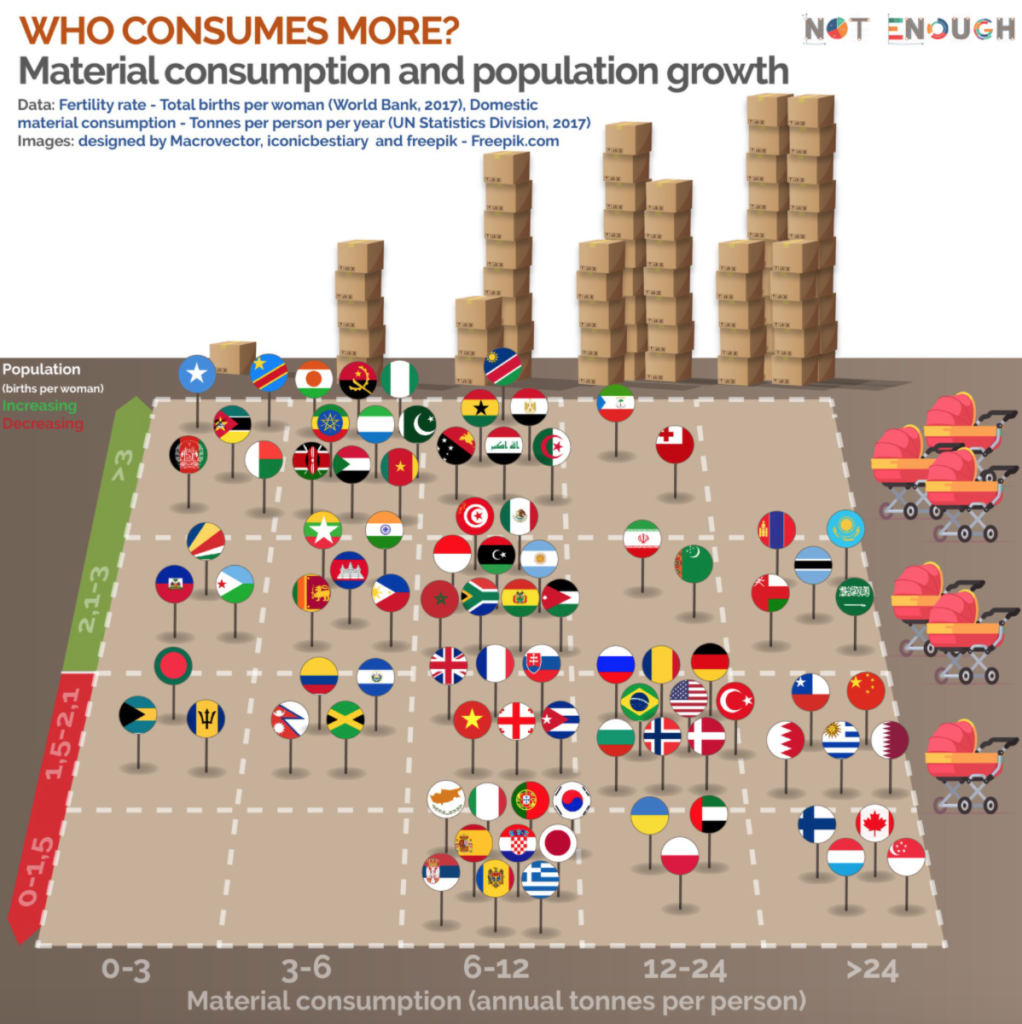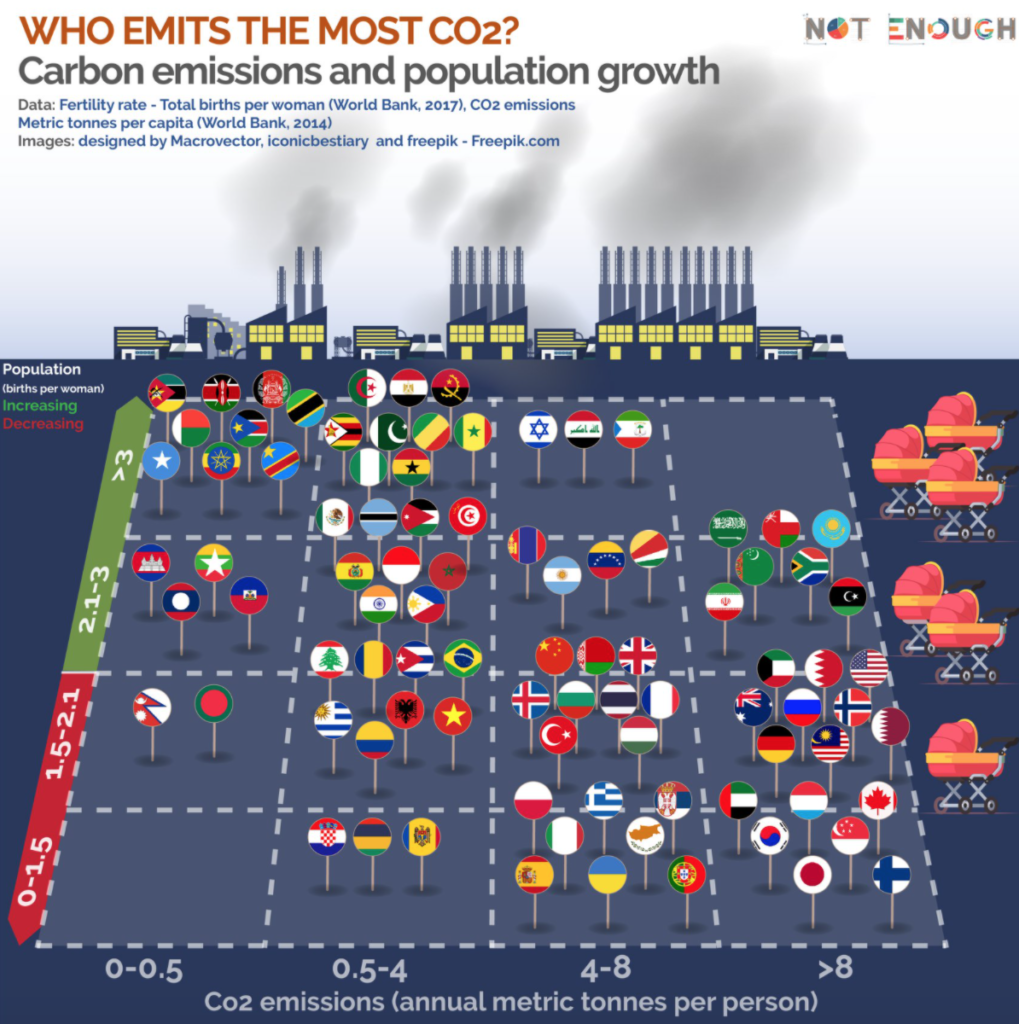DiEM25’s Taskforce on Peace and International Policy report on how members think the movement should address the climate crisis
Is overpopulation the main environmental threat of our time? The idea that global demographic trends and high fertility rates, especially in low-income countries, are the main drivers of climate change has gained some traction — especially within reactionary circles. Most DiEM25 members call on the movement to debunk this myth and shed light on the links between population, growth, and structural poverty.
DiEM25 asked this question to its membership as part of the ongoing work to develop a green paper on peace and international politics. We are thankful for the large and rich participation from the membership. The Taskforce is currently processing all the input received and drafting a document that will be presented to members in the upcoming months. Until then, we are sharing some of the main debates as part of this series of articles.
Confronted with the threat of the climate emergency, some embrace a simplistic view that reduces the problem to a question of overpopulation. This reactionary narrative, focused exclusively on the threat posed by global demographic trends and high fertility rates especially in poorer non-European countries, has gained some political currency.
On the right side of the political spectrum, such views risk reinforcing pre-existing populist notions of Western decline, replacement theories, and racist undertones about “other” cultures’ proclivity to have many children. Equally worrying is the use of this narrative to promote eugenics — the grotesque idea that the reproduction of certain human beings is considered to be ‘superior’, should be promoted to the detriment of all the others.
We would like to challenge these distorted views and discuss how structural poverty and the absence of social protection in low-income countries lead to high fertility rates.
To begin with, greenhouse-gas emissions are highly concentrated. The ten countries (we count the EU as one of them) with the highest absolute emissions, together, are responsible for 73% of all global greenhouse-gas released in the air. It is also estimated that the richest 10% inhabitants of the planet are responsible for 46% of total emissions growth since 1990. “Overproduction and overconsumption,” a DiEM25 member argues, “are greater evils than overpopulation. And the former two are primarily issues in Western and rich countries.” Others argue that “there is a direct correlation between someone’s wealth and the amount of CO2 they produce. A more egalitarian world would produce less CO2”.
Countries with higher fertility rates and a growing population emit on average less per capita than countries with a lower fertility rate and a decreasing population. The same trend exists when we look at material consumption. Why? Because higher fertility is often associated with lower incomes which in turns means less consumption and emissions.
The climate crisis is more of an issue related to income, lifestyles, and consumption, rather than population growth
As income levels increase, so does consumption and therefore emissions, while fertility tends to decrease. Pointing the finger exclusively at countries with growing populations is diverting attention away from other more consequential factors.

Source: Not enough
At the same time, the question of population growth cannot be addressed out of context. There is a large consensus in the respondents of the DiEM25 survey that structural poverty, not culture or religion (as conservative political forces want us to believe) is often correlated with high fertility rates.
For those who face destitution, high infant mortality rates, and cannot rely on functioning social protection mechanisms, having many children becomes “a strategy to survive” and ensure support for the elderly. DiEM25 respondents argue that “we should eliminate abominable poverty”, have a “better distribution of wealth” and advocate for a “basic income to be introduced at global level” to address the question.
Besides focusing on poverty and inequality, many highlight the importance of promoting women’s rights and education: “when you educate the girls, promote women’s rights, and create retirement programs, the fertility rate decreases”. Some have mentioned the importance of family planning and how facilitating contraception and allowing abortion promote women’s rights. However, while family planning is important, several members cautioned that such measures should in no way be imposed by external powers or legitimise the patriarchal control over women’s bodies.
Our members are equally wary of using distorted notions of overpopulation to promote eugenics, the suppression of reproductive rights for certain individuals or groups considered ‘inferior’ or ‘dispensable’. This concern was reinforced at the onset of the COVID-19 pandemic which exposed a cynical trade-off between economic growth and the lives of citizens labelled as ‘dispensable’: the old, the sick and some other groups considered to be a burden for society because they are non-productive and are costly for the health systems.

Source: Not enough
Distorted ideas about overpopulation should not be used as a distraction from socioeconomic problems
Overpopulation should not be wielded to dehumanise certain individuals or groups and deny their fundamental rights. The climate crisis, poverty and overpopulation are considered by the majority of respondents to be the symptoms of a degenerative global economy that accumulates wealth in the hands of few while creating inequality, poverty, as well as social and environmental degradation for the rest.
Photo Source: Pexels.
Do you want to be informed of DiEM25's actions? Sign up here










